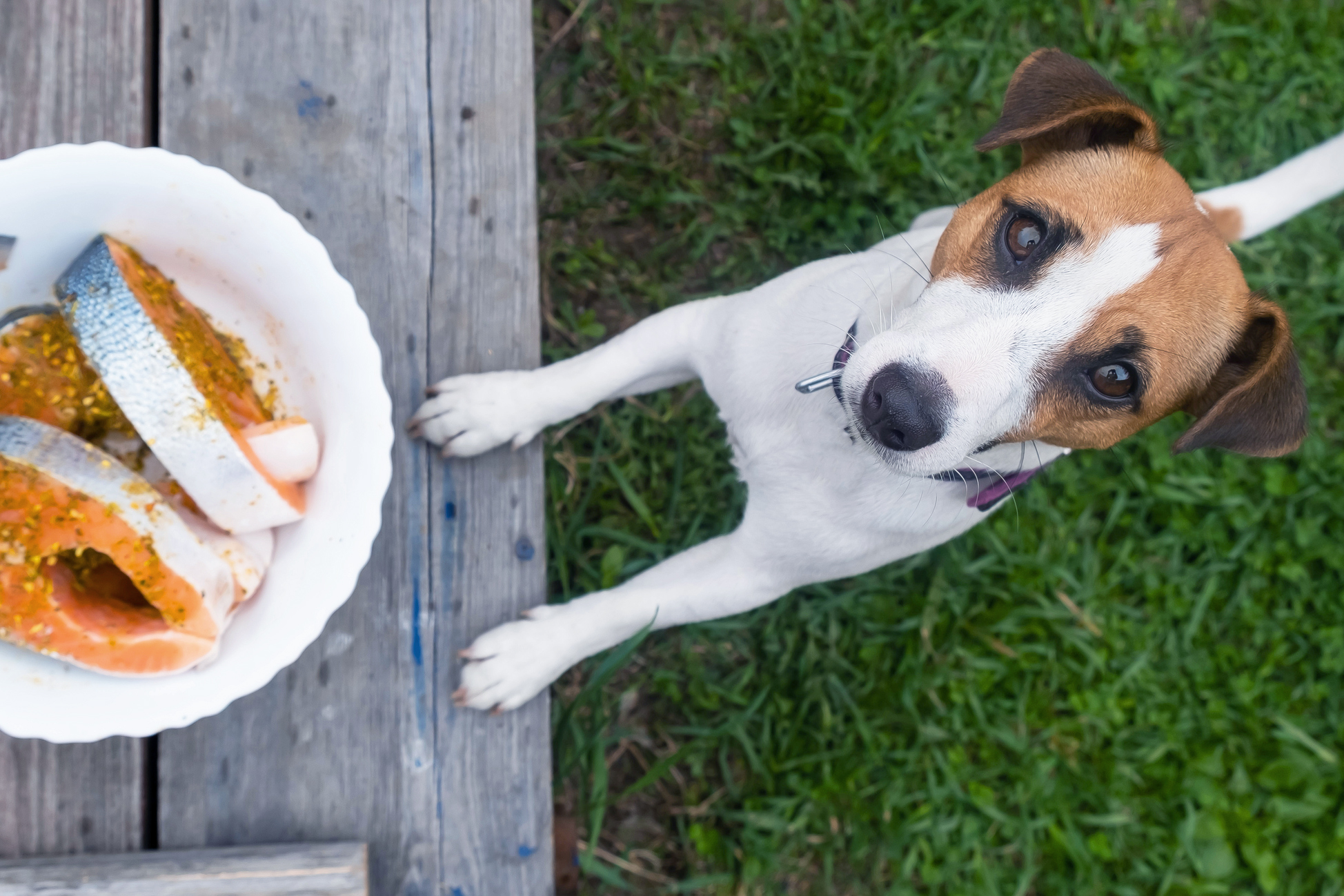Do dogs get ill after eating salmon?

Humans love eating salmon, as it’s versatile, tastes great, and comes with so many health benefits. So, you might be wondering if your canine companion can eat a little bit of salmon with you and enjoy the myriad health benefits that it’s renowned for. The simple answer is that dogs can eat salmon, but they can’t enjoy it in all the same ways as humans. Read on to find out how your pup can enjoy salmon, so they don’t fall ill.
Are dogs able to eat salmon?
Dogs can eat cooked salmon, and it’s just as nutritious for your furry friend as it is for you. Naturally rich in omega-3, protein, vital vitamins A, B, and D, and selenium and potassium, salmon is one of the most nutritious sources of fish out there. In particular, the omega-3 fatty acids will work wonders for your dog’s coat and will help to maintain healthy levels of growth while reducing inflammation. Salmon can also boost your pup’s cognitive function and will keep their brain healthy, which is crucial for pups and senior dogs. The antioxidant and anti-inflammatory properties of the fish will help to deal with issues including IBS, arthritis, or any allergies that your pup might have.
What’s more, salmon is regarded as a low-mercury fish, meaning it doesn’t contain the same level of contaminants and heavy metals that are associated with species that live longer – tuna being a good example. So, while your pup can enjoy salmon frequently, don’t overdo it, as you need to caution against the build-up of mercury in their body. Limiting your dog’s consumption of salmon is also important as far as their size is concerned, as too much fatty fish will cause them to gain weight. Be sure to only serve cooked, plain salmon to your pup, as seasoned ingredients can lead to illness or a stomach upset. You also need to check that there are no bones in the fish, as they are brittle and sharp, which can cause injury when swallowed.
What about raw salmon?
You should not feed raw or undercooked salmon to your dog. Whether fresh out the river or in the form of sashimi, don’t offer raw salmon to your pup, regardless of how much they pine for it. This is because parasites may still be present in the flesh of the fish. Also, because salmon swim upstream, they could be infected with parasitic flatworms. If these worms are infected by a parasite known as Nanophyetus Salmincola, it can make your dog particularly sick with an affliction known as ‘salmon poisoning.’
Salmon poisoning
You might be aware that cats can eat salmon without any issue and be wondering why dogs are affected differently. Well, the reality is that raw salmon can prove fatal to a dog, with salmon poisoning showing within 6-10 days. If untreated, your pooch can succumb to the poisoning and could die within 14 days of eating contaminated raw salmon. If your dog has eaten raw salmon and you notice some side effects, take them to a vet immediately. The signs to watch out for include:
• Vomiting and diarrhoea
• Lethargy
• Depression
• Dehydration
• Lack of appetite
• Fever and weakness
• Discharge from the eyes or nose
• Swollen lymph nodes
If your dog is affected by salmon poisoning, a vet will treat them with an anti-parasitic worming treatment to kill the flatworms. This will be followed by antibiotics that will treat the infection. So, if your pup eats some raw salmon, be sure to contact a vet right away to seek advice.
What about smoked salmon?
Smoked salmon isn’t safe for dogs because it has been cured rather than cooked. This means that smoked salmon may also contain bacteria and flukes, but the likelihood of infection is lower than it is if your pup eats raw salmon. What’s more, smoked salmon is high in salt, which isn’t good for your dog, particularly given that dogs require less salt than humans. Salt can lead to dehydration, sickness, and sodium poisoning, which can cause your dog serious health issues.
Can dogs eat the skin of salmon?
Provided it is cooked and plain, salmon skin shouldn’t cause an issue for your dog. It’s best to cut it into pieces before feeding skin to your dog, as opposed to peeling and tossing the skin to them! Remember that salmon skin contains a lot of fat, so you should only give it to your dog in small amounts.
Is tinned salmon good for dogs?
Dogs can eat tinned salmon in small amounts. This is because it contains a lot of salt, so you need to be mindful of how much you give them. If you can, look for tinned salmon that doesn’t contain any added salt, as it is much better for your pooch. Also, tinned salmon that is preserved in water is the best option for dogs, as any salmon that has been stored in oil will need to be drained. Brine is also another viable option, but the salt content is high, so limit their consumption to small amounts.
How much salmon can a dog eat?
Overall, moderation is key when you’re feeding your dog salmon. Perhaps limit your dog to salmon once a week as a treat, which is a good way for them to enjoy its health benefits. For every 450g your dog weighs, they can eat up to 10g of salmon safely. The key takeaway is that dogs can eat cooked, plain salmon, but you should never feed your pup raw salmon.
To treat your dog like a true member of the family, consider one of Pure’s tailored plans, so you can ensure they’re eating food that is high in nutrition to help your pooch thrive. What you feed your dog is vital for their health and wellbeing, so make sure you treat them to nutritious food that will never harm their health.
<!–
–>



